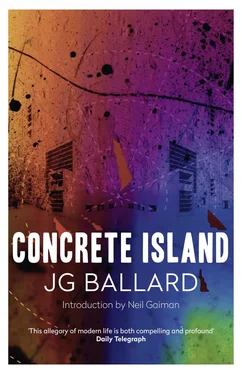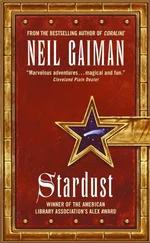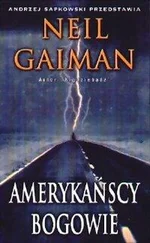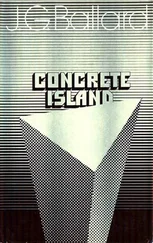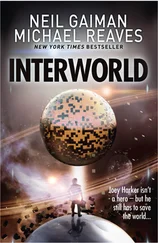J. G. BALLARD
Concrete Island

This novel is entirely a work of fiction. The names, characters and incidents portrayed in it are the work of the author’s imagination. Any resemblance to actual persons, living or dead, events or localities is entirely coincidental.
Fourth Estate
An imprint of HarperCollins Publishers Ltd. 1 London Bridge Street London SE1 9GF
www.harpercollins.co.uk
First published in Great Britain by Jonathan Cape Ltd 1974
Copyright © J. G. Ballard 1974
J. G. Ballard asserts the moral right to be identifiend as the author of this work
Introduction copyright © Neil Gaiman 2014
‘The Sage of Shepperton’ © Travis Elborough 2008
Cover by Stanley Donwood
A catalogue record for this book is available from the British Library
All rights reserved under International and Pan-American Copyright Conventions. By payment of the required fees, you have been granted the non-exclusive, non-transferable right to access and read the text of this e-book on-screen. No part of this text may be reproduced, transmitted, down-loaded, decompiled, reverse engineered, or stored in or introduced into any information storage and retrieval system, in any form or by any means, whether electronic or mechanical, now known or hereinafter invented, without the express written permission of HarperCollins e-books
HarperCollins Publishers has made every reasonable effort to ensure that any picture content and written content in this e-book has been included or removed in accordance with the contractual and technological constraints in operation at the time of publication
Source ISBN: 9780007287048
Ebook Edition © MARCH 2009 ISBN: 9780007321582
Version: 2016-08-17
Cover
Title Page
Copyright
Author’s Note
Introduction by Neil Gaiman
Chapter 1 – Through the crash barrier
Chapter 2 – The embankment
Chapter 3 – Injury and exhaustion
Chapter 4 – The water reservoir
Chapter 5 – The perimeter fence
Chapter 6 – The rain-storm
Chapter 7 – The burning car
Chapter 8 – The messages
Chapter 9 – Fever
Chapter 10 – The air-raid shelter
Chapter 11 – Rescue
Chapter 12 – The acrobat
Chapter 13 – The fire signal
Chapter 14 – A taste of poison
Chapter 15 – The bribe
Chapter 16 – The food source
Chapter 17 – The duel
Chapter 18 – Five pounds
Chapter 19 – Beast and rider
Chapter 20 – The naming of the island
Chapter 21 – Delirium
Chapter 22 – The pavilion of doors
Chapter 23 – The trapeze
Chapter 24 – Escape
Keep Reading
The Sage of Shepperton
About the Author
By the Same Author
About the Publisher
The day-dream of being marooned on a desert island still has enormous appeal, however small our chances of actually finding ourselves stranded on a coral atoll in the pacific. But Robinson Crusoe was one of the first books we read as children, and the fantasy endures. There are all the fascinating problems of survival, and the task of setting up, as Crusoe did, a working replica of bourgeois society and its ample comforts. This is the desert island as adventure holiday. With a supplies-filled wreck lying conveniently on the nearest reef like a neighbourhood cash and carry.
More seriously, there is the challenge of returning to our more primitive natures, stripped of the self-respect and the mental support systems with which civilisation has equipped us. Can we overcome fear, hunger, isolation, and find the courage and cunning to defeat anything that the elements can throw at us?
At an even deeper level there is the need to dominate the island, and transform its anonymous terrain into an extension of our minds. The mysterious peak veiled by cloud, the deceptively calm lagoon, the rotting mangroves and the secret spring of pure water together become out-stations of the psyche, as they must have done for our primeval forbears, filled with lures and pitfalls of every kind.
The Pacific atoll may not be available, but there are other islands far nearer to home, some of them only a few steps from the pavements we tread every day. They are surrounded, not by sea, but by concrete, ringed by chain-mail fences and walled off by bomb-proof glass. All city-dwellers know the constant subliminal fear of being marooned by a power failure in the tunnels of a subway system, or trapped over a holiday weekend inside a stalled elevator on the upper floors of a deserted office building.
As we drive across a motorway intersection, through the elaborately signalled landscape that seems to anticipate every possible hazard, we glimpse triangles of waste ground screened off by a steep embankments. What would happen if, by some freak mischance, we suffered a blow-out and plunged over the guard-rail onto a forgotten island of rubble and weeds, out of sight of the surveillance cameras?
Lying with a broken leg beside our overturned car, how will we survive until rescue comes? But what if rescue never comes? How do we attract attention, signal to the distant passengers speeding in their coaches towards London Airport? How, when faced with the task, do we set fire to our car?
But as well as the many physical difficulties facing us there are the psychological ones. How resolute are we, and how far can we trust ourselves and our own motives? Perhaps, secretly, we hoped to be marooned, to escape our families, lovers and responsibilities. Modern technology, as I tried to show in Crash and High Rise , offers an endless field-day to any deviant strains in our personalities. Marooned in an office block or on a traffic island, we can tyrannise ourselves, test our strengths and weaknesses, perhaps come to terms with aspects of our characters to which we have always closed our eyes.
And if we find that we are not alone on the island, the scene is then set for an encounter of an interesting but especially dangerous kind…
BY NEIL GAIMAN
Memories of J. G. Ballard, Jim to his friends – and I was never one of them, being too young and arriving too late in the world of writers, but still, he’s Jim Ballard as I was introduced to him, like the boy in Empire of the Sun . He was standing beside William Burroughs at an art opening, affable and dry and avuncular, thoroughly suburban, as he observed the eighties artistic freakshow that surrounded him, somehow managing to be both part of it and detached. I did not talk to him, then or any of the times I could have done. I was awed, and he always seemed too near and too far away.
Children, the kind who read, read everything that they find in the house; they read their parents’ books (the ones the parents had as children, the ones they had as adults); they read Daniel Defoe’s Robinson Crusoe alongside Isaac Asimov’s The Caves of Steel ; The Coral Island then Dune Messiah ; The Island of Adventure beside Conan the Adventurer : they read all the books they can because the books are there, and because books offer information and escape. Or I did, anyway. Also, I knew we were all headed for the future, and I wanted to know what things would be like when we got there, surrounded by robots, with our hand-held communications devices.
Which meant that, growing up, two of my favourite books were The Crystal World by J. G. Ballard – a strange apocalypse I barely understood, and to which I was attracted by the cover, showing a beautiful, glassy landscape, and the back-cover blurb, which told me that this was about people exploring the Amazonian rainforest, trying to find out why the world was becoming crystal – and SF 12 , edited by Judith Merrill, the book in which I discovered R. A. Lafferty and William Burroughs, Samuel R. Delany and Kit Reed, Carol Emshwiller and Fritz Leiber, Brian Aldiss and Tuli Kupferberg and a host of authors and ideas, including a story called ‘The Cloud-Sculptors of Coral D’, by J. G. Ballard, about a cloud sculpture and the men who fly small planes, about love and about murder.
Читать дальше
